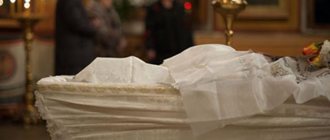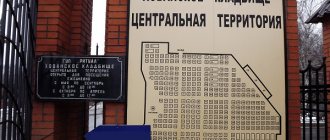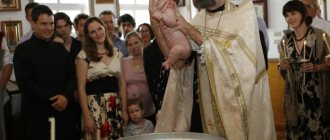Where does the soul go after the body dies?
It is generally accepted that a person is body and consciousness, but this is a human vision, because it has become customary to evaluate only what can be seen with the eyes. The rest has to be taken “on faith” or, trusting someone’s authoritative opinion, who can argue for the presence of this or that invisible being, convince others. A true believer knows that man is body, spirit and soul. Moreover, the last of the listed components is paramount.
God created man's body from the dust of the ground (Genesis 2:7). But it was lifeless, for afterward the Lord “breathed into his face the breath of life,” which means the acquisition of a soul, the beginning of spiritual life. This is confirmed by the death of the incorruptible shell and body on different days. When the Lord commanded: “You shall not eat from the tree of good or evil, for in the day that you eat from it you will surely die” (Genesis 2:16-17). But the Bible indicates that Adam continued to live and gave birth to sons (Genesis 5:4-5).
This is not a contradiction, but suggests that when he was expelled from paradise, his soul died. The body continued to live. He died much later.
The incorruptible shell leaves the earth after the death of the body, but not immediately, but on the third day, as happened after the death of Jesus, when he ascended to Heaven. Next, the soul is tested, goes through 20 ordeals, when it ends up in hell, having been in paradise, seeing its radiance. Here she meets the abodes of Good and Evil. But he ends up in one of them for a long time only after the Private Trial, when on the 40th day he appears before the throne of the Lord.
Soul in the astral plane
Death as the beginning of eternity
Orthodoxy teaches that after death a person does not cease to exist. The soul created by God is immortal. But as a consequence of the sin committed, the transgression of the Creator’s commandments, the human body undergoes decay (Genesis 3:19). Christians believe in the future general resurrection of the dead. And the funeral service for the deceased is filled with this thought. This hope is reflected in the Creed adopted at the First and Second Ecumenical Councils (4th century): “I look forward to the resurrection of the dead and the life of the age to come.”
Funeral service for the deceased in the temple
These words, pronounced by believers every day (the Creed is included in the morning prayer rule), do not allow one to fall into boundless and inconsolable grief when losing loved ones. Earthly life is perceived as preparation for a future eternity. And this preparation ends with death.
“What is death? Death is not a coffin at all, not a canopy, not a black bandage on an arm, not a grave in clay. Death is when the sprout of our life crawls out to the surface of the earth and stands under the direct rays of God's sun. The grain of life must die and germinate here, in the earth. This is the so-called “birth in the spirit” in the Gospel, the “second birth” of a person. The death of the body is the leaving of a sprout of the earth, an exit from the earth. Any person who has received even the smallest spiritual leaven, even the most insignificant gospel pearl “inside himself,” will not face death at all, and even far from death” (Archbishop John Shakhovskoy, 1902-1989).
What is a funeral service for the deceased? The sacrament of the funeral service for the deceased in church
Funeral service is the popular name for a divine service, which is accompanied by the reading of prayers, chants, and actions. In Russian Orthodoxy this is the Rite of Burial, and in the Trebnik it is the Mortality of Secular Bodies. If you are wondering what a funeral service is, you need to take into account that during this service many rituals are performed that are carried out sequentially. Moreover, most of the prayer texts are read in a chant. This explains the origin of the popular name.
The purpose of the funeral service is to prepare the soul of the deceased for the transition to another world. This service is preceded by a short requiem. Thanks to numerous prayers, some of the sins are forgiven, because the soul cannot repent. This is the lot of those living on earth. That is why it is so important to ask for forgiveness in time for the atrocities committed. After death, the soul can only count on the help of loved ones who order Sorokoust, read prayer texts, and lead a righteous life. The clergy conduct the rituals: requiem, liturgy, funeral service.
This is additional help to the soul, thanks to which the fate of the deceased can be changed.
Funeral service at home
Traditionally, funeral services are held for the dead in a church, less often this happens at home or in other places: in a cemetery, in the funeral hall of a morgue. But preference should be given to the first option. The sequence of actions when performing the funeral service:
- The coffin with the deceased is brought into the temple; it must be prepared: dressed, with a crown on its head. The body is covered with a shroud on top, a cross is in the hands of the deceased, and a body cross is placed on the chest.
- The coffin is placed in front of the altar.
- Lighted candles are placed on the lid. This is a symbol of rebirth, the victory of life over decay and death. Relatives who went to the temple to see off the deceased on his final journey should also hold candles.
- The priest says prayers.
- Relatives also pray, asking forgiveness for sins: their own, those of the deceased, for one who has not repented cannot ask for another. Such words will not reach the Lord.
- The prayer text is placed in the coffin - the deceased must hold it in his hands.
- There is a farewell to the deceased.
The funeral service should be performed in relative silence: relatives are not recommended to cry loudly, moan, or sob. We need to ask God for strength to bear the loss. Later, you can submit notes of repose, but only for those for whom a funeral service was held. There are different options:
- mass;
- memorial service;
- a simple note.
Representatives of many faiths (Protestants, Catholics) perform similar rituals after the death of parishioners, with the exception of minor differences.
Funeral service for the deceased
How does the funeral service of a deceased layman take place?
Previously, the funeral service for the deceased took place only in church. In the 20th century, in order not to attract the attention of the Soviet authorities, this funeral service began to be performed at home. This practice has continued to this day. However, it is still more correct to serve the funeral rite in the temple.
The coffin with the deceased is brought into the church and placed in the center in front of the Royal Doors. It is positioned so that the feet of the deceased are facing the iconostasis. Then the deceased’s face is turned towards the altar, like all those praying. It is typical for the Orthodox Church to keep the coffin open. Catholics do not do this.
The body of the deceased is covered with a special funeral blanket. This is a symbol of the covering of Christ. An icon of the Savior (for men) or the Mother of God (for women) is placed on the chest of the deceased. The believer is not buried with it (the icon is taken home). As a sign that the deceased was a faithful Christian, a cross is placed in the left hand. A “corolla” is put on the forehead - a ribbon with the words “Holy God, Holy Mighty, Holy Immortal, have mercy on us.”
Lighted candles for those present at the funeral service are a symbol of ardent love for the deceased.
The church hymns of the burial rite speak about the temporality of earthly existence, about its perishability. But they also remind us of the resurrection of the dead. The Gospel text read at this time testifies to God's righteous judgment (Gospel of John, 5:24-30). The prayers contain a request to open the doors of heaven for the soul of the deceased and to grant her peace. At the end of the burial ceremony, the priest reads a prayer of permission. Then the scroll with this prayer is placed in the right hand of the deceased. This is a sign of forgiveness of sins and reconciliation of a person with the Lord.
Types of funeral rites. Behavior rules
Liturgical books contain several versions of services. They are divided into 2 types: for laity of different social statuses, ages, and also for clergy. The second type of worship is distinguished by a more significant duration.
Funeral service in church
Babies
Funeral services are not held according to all traditions. Gregory the Theologian wrote about such babies: “They will not be glorified and will not be punished by the righteous Judge.” This means that there is no opportunity to go to heaven, but such souls do not end up in hell either. It has always been believed that those who were not baptized before the age of 7, as well as those who were stillborn and died in the womb, and those unborn as a result of an abortion, do not have a funeral service. But some time ago the rules changed.
In Yekaterinburg, the Order of succession was approved for deceased infants who did not receive the grace of the sacrament of baptism. The Holy Synod decided that it is permissible to perform a ritual to alleviate the suffering of parents. In addition, a petitionary prayer is read for the fate of the baby.
Layman
If a person was a believer during his lifetime, was baptized, attended church, confessed, took communion, then he will be received by the Lord through a funeral service in the church. The ceremony usually lasts half an hour.
Funeral service for the deceased
Monastic
Until the 16th century, the rite of funeral service for a layman and a monk was not much different. Today the difference between services is more significant:
- there is a division of kathisma 17 not into 3, but into 2 sections, while other refrains are pronounced;
- the canon for the departed is not sung, but sedate antiphons of 8 voices are read (from the Octoechos);
- when “Blessed” is sung, troparia are read, which resemble the monastic vows of the deceased;
- before the last kiss 5-10 the stichera are not read, they are replaced with special words;
- other prayers are said when the body is brought out;
- when throwing earth onto the coffin, troparia are read.
Priestly
The funeral service is carried out according to special rules. The Priestly Rite of burial is intended for priests. The main differences: even more significant duration, solemnity. The clergy believe that the one who has received the grace to sanctify others is honored in a special way at the last farewell.
Priestly ordination
Arakhiereyskoe
Not required. This funeral service is carried out according to the instructions of the First Sanctified. It has several differences from the priestly one: the performance of “The Immaculates” is performed in 2 sections, and not in 3; the choruses are pronounced, as in the monastic rite of Burial. In addition, new troparia and sedals are added.
On the first week of Easter
It is also permissible to conduct a funeral service for the deceased on the eve of the bright religious holiday of Easter. But there are restrictions in this regard - the funeral rite is not performed directly on Easter week. The funeral service on the eve of a great holiday is distinguished by greater joy. Such a service excludes sad chants.
Funeral service for the deceased
Why do they perform funeral services for the dead?
What is a funeral service for a deceased person? Why is it needed?
The funeral service for the deceased in Orthodoxy is called the Rite of Burial. This is a special service that is performed once over the body of the deceased. On the one hand, it is designed to ease the grief and grief of loved ones gathered at the coffin, to calm their souls, and to soothe the sadness of separation. On the other hand, it is an intense prayer for the soul of the deceased. At the funeral service, the priest reads a prayer of permission. It contains a request for forgiveness of the deceased’s sins, for which repentance was brought in confession during life.
The author of this prayer is considered to be the Monk Theodosius of Pechersk (11th century). The prayer of permission is read only once, during the funeral service. In this way, this service differs from a memorial service (a funeral service that can be performed an unlimited number of times).
In the Orthodox Church, there are 5 types of funeral services: for lay people, monastics, priests (including bishops), children under 7 years of age, and also for the first week after Easter (Bright Week).
Who can have a funeral service?
A funeral service in a cemetery, in a church, at the home of the deceased or in the funeral hall of a morgue - any of the methods of performing a service is suitable when you need to escort a believer, a baptized person, into another world. When a lay person dies, relatives must provide documents confirming the person's status and cause of death. You cannot sing the funeral service:
- suicides;
- unbaptized;
- Gentiles;
- those who spread heresy about the Almighty;
- baptized people who renounced the faith;
- atheists.
It is not always possible to confirm the status of the deceased: if he is a non-religious person, not an atheist, or did not blaspheme God.
Previously, it was believed that it would be a sin to perform a funeral service for a criminal. Today this is permissible, but there are special conditions, for example, such a person had to repent during his lifetime, return to God, take communion, confess, and attend church.
Worship in the temple
Necessary conditions for the ceremony
Often, during preparation for the funeral ceremony, due attention is not paid to the conditions under which the service should be performed. This may cause the funeral service to be invalid. This means that it is imperative to find out whether these requirements are met.
Funeral service for the deceased at home
Will of the deceased
It is believed that a deceased Christian who attended church, by default, consents to the service being performed over him after death. However, there are those who, for various reasons, decide to refuse to perform the Funeral Rite. Also, some want a certain clergyman to help guide them on their final journey. Then it is better to put your request in writing, which will take a little time, but then will allow you to fulfill the will of the deceased.
In the same way, you can choose in advance the temple where the deceased will be buried.
The fact of the baptism of the deceased
A funeral service may be held without written confirmation of the sacrament of baptism. But people should, if possible, provide evidence of worship. Many people keep the document, which means it won’t be difficult to confirm this fact.
Church candles and icon
Death certificate from the registry office
Relatives of the deceased often try to fraudulently obtain the burial ceremony. In order for the service to take place according to all the rules, the clergy ask to present a certificate of death of the person. It is issued by morgue staff after death. But this document can be obtained fraudulently, even if the deceased committed suicide. Relatives take care of his soul in this way, not understanding the danger of this. The clergyman will not be able to verify the authenticity of the certificate; he will take on faith what the relatives say.
Death certificate, sample
Documents about the deceased
In addition to the death certificate and baptismal certificate, a passport of the deceased is also provided. This procedure allows you to make sure that there is no mistake, the funeral service is carried out for the right person.
Setting a date for the funeral service
They agree in advance on the time of the service. Previously, it was customary to bring the deceased to the temple immediately after death. The coffin was here all three days before the funeral. Today this tradition has become obsolete. But it is possible to leave the deceased in the temple 1 day before the burial. All this time they read the Psalter. It is permitted to pronounce sacred words over the deceased in a chapel at a mortuary or in a cemetery. At the same time, the burial ceremony is performed according to the same rules.
Preparation of ceremonial rituals
In the temple, the deceased must be completely ready for burial. It is important to find out in advance what is needed for the funeral service:
- pectoral cross - the one that the deceased wore during his lifetime is taken; in case of loss, it can be purchased;
- aureole - a paper ritual attribute, meaning the crown of Glory, which the deceased receives for a righteous life, entering the Kingdom of Heaven;
- shroud;
- cross for placing in the hands of the deceased;
- an icon for placement in the coffin during the funeral service; it is taken away before the coffin lid is nailed down;
- prayer of permission - sold in a shop at the temple;
- Church candles can also be purchased at the place where the service will take place.
For comparison, it is permissible to bring a flower to a funeral, but not to a funeral service. Those who come should only hold a candle. It is necessary to find out the cost of the ceremony. For example, in Moscow – up to 5 thousand rubles. In the regions (Kirov, Vladimir, etc.) the price is lower. Moreover, it does not matter whether the ceremony is performed over a coffin or an urn after the crematorium. Often there is no fixed rate; relatives make a donation to the temple.
Funeral ritual
Funeral service in absentia, reasons
In some cases, a funeral service is held after the funeral, when the deceased is already buried under the thickness of the earth:
- in the absence of a temple nearby;
- if the burial was carried out quickly, it was not possible to perform a funeral service for the deceased;
- in case of death under extraordinary circumstances: during a disaster, in a plane crash, etc.;
- if the deceased was a military serviceman, died as a result of hostilities, in combat conditions;
- the body was not found (death occurred as a result of a cataclysm).
An absentee funeral service can be performed before or after the funeral. In the first case, the body could not be found, in the second, the funeral was carried out in a hurry, there was no way to postpone it. When the ritual is performed, the same prayers are read. The difference between in-person and absentee funerals is that in the absence of the body during the service, the relatives are given a whisk, a handful of earth and a prayer of permission. If there is a possibility that a body will still be found, these ritual attributes can be used for their intended purpose, but a little later.
Prayer for the departed for the repose of their souls
Funeral service for the deceased as a special service
The appearance of funeral prayers dates back to the very beginning of the history of Christianity. Then the burial of believers took place at night. Christians could not bury their dead openly and in daylight because of the persecution brought against the Church. Subsequently, the burial rite was separated from the all-night service.
The funeral service can be performed for any baptized person. The only exceptions are suicides who voluntarily deprived themselves of the Divine gift of life, which is a grave sin.
The spiritual meaning of performing a funeral service is to pray together for the soul of the deceased. Relatives and relatives ask the Lord for forgiveness of the sins they have committed.
“When we stand and pray for the deceased, we are actually saying: “Lord, this person did not live in vain. He left an example and love on earth; example we will follow; love never dies". By proclaiming before God our undying love for the deceased, we affirm this person not only in time, but also in eternity. Our lives can be his redemption and his glory.
We can live, embodying with our lives everything that was significant, lofty, genuine in him, so that someday, when the time comes for us and all humanity to stand before God, we will be able to bring to the Lord all the fruits, the entire harvest of seeds, sown by his example, by his life, which sprouted and bore fruit thanks to our undying love, and say to the Lord: “Take this from me; it belongs to him, to her: I am only a field; he was a sower! His example, his word, his personality were like a seed thrown into the soil, and this fruit belongs to him” (Metropolitan Anthony of Sourozh).
“Question-answer” section
After the funeral service does the soul go to heaven?
Expert opinion
Father Pavel
Clergyman
After the death of a person, the soul goes through a conventionally difficult path. At first, the incorruptible shell remains next to the body until it is buried. Starting from the third day, he is in paradise, but only as an observer to experience the incredible beauty of this monastery. The remaining time - from 9 to 40 days - the incorruptible shell remains in hell. Here she is also an observer, because she must compare the amount of suffering with the highest measure of happiness that can be felt in heaven. At the same time, the soul goes through ordeals. The last stage is a private court, based on the results of which the permanent place of residence of the incorruptible shell is determined. Only now can she go to heaven and stay here permanently. But also after a Private Judgment, the souls of the dead often end up in hell. To prevent this from happening, you need to lead a righteous lifestyle.
How do they dress for a funeral service?
Expert opinion
Remontnikov Vladimir Petrovich
Religious scholar, historian
When a funeral service is held in a morgue, cemetery, home or church, attire must be appropriate for the occasion. Clothing in dark shades is suitable, and it should be closed. For women, the preferred option is a dress (long or 3/4 sleeves), a skirt below the knee, or better yet, a floor-length one, and a blouse with a closed neckline. An important accessory is a scarf on the head. It is not recommended to wear jewelry. Clothes should not have prints, designs, patterns or rhinestones. Men are recommended to wear a dark suit and a white shirt. No headdress needed. Items selected for the funeral service are also suitable for the funeral.
People at the funeral service
Do relatives need to be in church for the funeral service?
Expert opinion
Father Pavel
Clergyman
The funeral service is not obligatory, but one should not refuse to hold it for mercantile reasons (for example, in order to save money); this is considered a sin that relatives take on their souls. If a funeral service is held, you must adhere to the rules of behavior during the ceremony. First of all, relatives must be present at the service. The soul is close to the body, which means it will rejoice at its loved ones. In addition, relatives pray for the deceased.
How to conduct a funeral service at a grave?
Expert opinion
Father Pavel
Clergyman
The order of the ceremony does not depend on the place. The exception is when the burial occurs on a Great Orthodox holiday. During the service, prayers are read. When performing a funeral service at a grave, there is no opportunity to place the coffin at the altar, but religious rituals can be replaced by diligent reading of prayers.
What to do if it is unknown whether a person is inveterate or not?
Expert opinion
Father Pavel
Clergyman
The funeral service is held once. It should be remembered that this is a ritual that involves the need to read many prayers, which means the opportunity to bring the soul of the deceased closer to the Lord. This means that the service cannot cause harm, and therefore a second funeral service is permissible, but there are some conditions for its performance:
- if it is unknown whether the burial ceremony was carried out, it is necessary to order a funeral service in absentia;
- repeating a divine service is not a serious violation, but only if it was carried out out of ignorance, when there is no way to verify whether the ritual was performed previously.
Prayer for the departed
What if a funeral service was held for a missing person alive?
Expert opinion
Father Pavel
Clergyman
Prayer for the dead has meaning only for them. The living (whether adults or children) will not suffer after the service of the Funeral Rite. This means that the sacred texts for health, read about the dead, and for peace, spoken about the living, will not resurrect the deceased in the first case, just as they will not kill the living in the second case. Prayer is aimed at helping one’s neighbor, addressed to the Lord, and therefore cannot harm anyone. But among non-believers there is an opinion that the funeral service is a magical ritual, after which negative consequences are possible for the living: the person will get sick or even die. It is a delusion and even a sin to believe so.
Is it necessary to kiss the deceased after the funeral service?
Expert opinion
Remontnikov Vladimir Petrovich
Religious scholar, historian
Like many customs of Orthodoxy, the tradition of the last kiss of the deceased after the funeral service, before burial, has been preserved since pagan times. It was believed that in this way it was possible to take away from the deceased the remaining strength that he no longer needed, and completely to the living. The tradition of the last kiss has been preserved to this day. At the same time, it acquired a different meaning: this is how loved ones help remove the burden from the soul, ease the transition to a new life - eternal.
Kissing the deceased after the funeral service
Is it possible to perform a funeral service for the deceased yourself at home?
Expert opinion
Father Pavel
Clergyman
There are quite a few rituals that help lighten the burden of the soul of the deceased. The funeral service is different from the others:
- carried out once;
- is performed by the entire church, which greatly increases the effectiveness of prayer.
This means that relatives will not be able to repeat the ritual on their own, even if they try. Despite the fact that the service lasts a relatively short time, it is difficult to perform it as it happens in church. Another problem is that prayers are often read in Church Slavonic, which sounds and is pronounced unusually.
How long does a funeral service take in church?
Expert opinion
Father Pavel
Clergyman
The service in honor of a deceased layman is shorter than in the case when the funeral service is held for a clergyman or monk. Most often, the funeral service lasts 25-50 minutes. But it may take less/longer. If you are wondering how long a funeral service lasts in a church, cemetery, home or funeral hall of a morgue, the answer cannot be unambiguous. The duration depends on the conditions under which the reading is performed. For example, the cemetery may be hampered by unfavorable weather, and the funeral hall may be hampered by a busy schedule of funeral ceremonies.
Funeral service in absentia
Is it possible to have a funeral service for the deceased in a cemetery?
Expert opinion
Father Pavel
Clergyman
The rite of burial is an important stage of burial. It is recommended to carry it out by strengthening the prayer word with the holiness of the temple. However, this is not always possible. If there are compelling reasons why the funeral service should take place in a cemetery, then there can be no obstacle to this.
Is it necessary to have a funeral service for the deceased or is it possible to bury him without one?
Expert opinion
Remontnikov Vladimir Petrovich
Religious scholar, historian
The funeral service is not obligatory. However, there are many clarifications. For example, for a believer this is a very important rite that prepares the soul for another life - eternal. Prayers, parting words, requests for forgiveness of sins for the deceased - all this is a great gift for the incorruptible shell. But if the ceremony was not performed because the relatives wanted to save money, then this is considered a sin, and it is taken on the soul by the relatives of the deceased, but not by himself.
How to behave at a funeral service in church, what clothes are needed?
Expert opinion
Remontnikov Vladimir Petrovich
Religious scholar, historian
For everyone who is in the temple, there are recommendations on the form of clothing:
- women: dress (long sleeve), skirt covering the ankles;
- men: dark suit, white shirt;
- deceased: new or clean, ironed clothes, shroud.
For those going to the funeral service, it is important to consider some rules:
- everyone should hold a church candle;
- those who come face the altar, and not the coffin, as many mistakenly believe;
- it is necessary to make the sign of the cross in a timely manner, pray.
Funeral service for the deceased
Do funeral services take place during Lent?
Expert opinion
Father Pavel
Clergyman
During Lent, it is permissible to hold a funeral service, and there are no time restrictions. Any day is suitable for this. Many people confuse the ban on holding services directly on Easter.
When is it not possible to have a funeral service?
Expert opinion
Father Pavel
Clergyman
Regardless of the format of the service (open, when the message is sent to everyone, or closed, like the Old Believers), the Rite of Burial is not performed on the great holidays of the Russian Orthodox Church. First of all, we are talking about days such as Christmas and Resurrection.
Is it possible to have a funeral service in a closed coffin?
Expert opinion
Remontnikov Vladimir Petrovich
Religious scholar, historian
A closed coffin is an acceptable condition for the burial ceremony. This is possible during the ceremony in absentia, as well as in cases where it is not possible to perform the service with the lid open (quarantine due to a developing infectious disease, severe injury to the body, etc.).
Church canon of funeral service. Texts of prayers
It is difficult to remember a large number of prayer texts. They can be downloaded for reading, but it is worth doing this if you pray at home. During the funeral service in the church there is great support for the church, so the main actions are performed by the clergy. The order of pronouncing prayer words:
- the initial prayer is the generally accepted beginning of sacred texts (but is also used in the middle, as well as at the end of the service), after which the service begins, the general meaning is to glorify the Lord, the Trisagion is said, as well as a short doxology of the Most Holy Trinity, and other short prayers;
- reading Psalm 90 is a universal prayer text, pronounced not only for funeral services, it brings great help to the soul, but is more often used as a prayer when a dangerous situation arises;
- Kathisma 17 is included in Psalm 118, which is considered the largest in the entire Bible (contains 176 verses);
- singing the troparion in tone 5: this is the name of the short prayer, it contains the essence of the occasion for which loved ones gather, the meaning of the troparion comes down to glorifying the Lord, accepting His will, including mortification of the flesh (“he ordered us to endure death”);
- funeral litany: can be read on any days except religious holidays and Sundays, the main condition for performance is the open gates of the church, the ritual should also be performed after the special liturgy at the liturgy;
- singing sedal for the repose: this is the name of the chant, this format of pronouncing sacred texts is used during the performance of divine services of the Orthodox Church, this format of the text received its name due to the permission to sit while pronouncing or listening to it;
- the 50th Psalm is read: it has a different name - “repentant”, was composed by David after committing atrocities;
- funeral canon 6th tone: called “Risen”, after each irmos the troparion is read four times, the further order also changes (after the third song the funeral litany is pronounced);
- Theotokos sedalna - part of the funeral canon of the 6th tone, more precisely, it is read at the end of this segment of the sacred text;
- the funeral litany is pronounced and the funeral kontakion is sung: they pray for the repose of the soul of the deceased, hope for the continuation of his life forever and ever;
- funeral ikos: the one Lord is glorified, who created man from dust, and he will turn into dust, and instead of funeral sobs, a sacred song should sound;
- 8 funeral stichera of John of Damascus: these are separate chants, tied to one of the psalms, pronounced as part of the Funeral Rite, compiled by John of Damascus, who is also the author of a large number of religious texts;
- Blessed: these are the Beatitudes, believed to have been given by Jesus Christ during the Sermon on the Mount, and are in addition to the 10 Commandments, which have become widespread;
- Prokeimenon: the format of reciting one of the verses of the Psalm, it is repeated several times, usually before the reading of the Apostle, the Gospel, and is an addition to the main part of the service;
- Apostle, 270 conceived: a liturgical book containing prokemenas for special services, the text contains assurance of the inviolability of the Lord's help during the resurrection of the righteous, and also gives hope for the resurrection, which will allow them to return to the Heavenly Father;
- Conception 16 from the Gospel of John: the book was written by John the Theologian, the beloved disciple of Jesus, the text “Conception 16” contains assurance of the imminent resurrection before the Last Judgment, when the dead will hear the voice of the Lord;
- litany of repose: the meaning of the text is a plea for mercy for all people, and those reading it also ask for the deceased;
- farewell to the deceased while singing the stichera of the second tone, accompanied by Podoben (a special form of singing based on a melodic model), represents the musical setting of the service;
- Trisagion and Our Father: The Trisagion is a combination of songs, and the Our Father concludes the service, while addressing the Most High, God the Father and the Son, the Holy Spirit (all incarnations of the Lord);
- recitation of troparia 4 voices, the litany of repose is read again;
- choir singing and Eternal Memory: during the reading of the farewell prayer “Sequence of the funeral service for the laity,” the coffin is taken out of the church.
Follow-up of the Panikhida, for reading by the laity.
Through the prayers of the saints, our fathers, Lord Jesus Christ, our God, have mercy on us. Amen.
Holy God, Holy Mighty, Holy Immortal, have mercy on us. (Thrice)
Glory to the Father and the Son and the Holy Spirit, now and ever and unto ages of ages. Amen.
Most Holy Trinity, have mercy on us; Lord, cleanse our sins; Master, forgive our iniquities; Holy One, visit and heal our infirmities, for Thy name's sake.
Lord have mercy. (Thrice) Glory, and now:
Our Father, who art in heaven, hallowed be your name, your kingdom come, your will be done, as it is in heaven and on earth. Give us this day our daily bread; and forgive us our debts, just as we forgive our debtors; and do not lead us into temptation, but deliver us from the evil one.
Lord, have mercy, (12 times). Glory, and now:
Come, let us worship our God the King (bow).
Come, let us bow down and bow down to Christ, our King God (bow).
Come, let us bow and fall down to Christ Himself, the King and our God (bow).
Also Psalm 90.
Living in the help of the Most High, he will dwell in the blood of the heavenly God. The Lord says: You are my protector and my refuge, my God, and I trust in Him. For He will deliver you from the snare of the trap, and from the words of rebellion, His splash will overshadow you, and under His krill you hope that His truth will surround you as a weapon. Do not fear from the fear of the night, from the arrow that flies in the days, from the thing that passes in darkness, from the gristle and the demon of the midday. Thousands will fall from your country, and darkness will be at your right hand, but it will not come near you, otherwise you will see your eyes and see the reward of sinners. For You, O Lord, are my hope; You have made the Most High your refuge. Evil will not come to you, and wound will not approach your body, as His Angel commanded you to keep you in all your ways. They will lift you up in their arms, lest they dash your foot against a stone; tread on the asp and the basilisk, and cross the lion and the serpent. For I have trusted in Me, and I will deliver; I will cover also, because I have known My name. He will call to Me, and I will hear him, I am with him in sorrow, I will destroy him and glorify him, I will fulfill him with the length of days and show him My salvation.
Glory, and now: Alleluia, alleluia, alleluia, glory to Thee, O God. (Thrice.)
Voice 8: Alleluia. Alleluia. Alleluia.
Chorus: Alleluia. Alleluia. Alleluia.
Verse 1: Blessed are you, who have chosen and accepted, O Lord.
Chorus: Alleluia. Alleluia. Alleluia.
Verse 2: Their memory lasts forever.
Chorus: Alleluia. Alleluia. Alleluia.
Verse 3 : Their souls will dwell in good things.
Chorus: Alleluia. Alleluia. Alleluia.
Troparion, tone 8:
With the depth of wisdom, build everything humanely / and give what is useful to everyone, / To the One Creator, rest, O Lord, the souls of Thy servant, / having placed their trust in Thee, / Creator and Maker and our God. [Twice.]
Glory, and now: To you and the wall and refuge of the imam, / and the prayer book is favorable to God, / Whom you gave birth to, the brideless Mother of God, salvation of the faithful.
And troparia:
Blessed art thou, O Lord, / teach me by thy justification.
You will find the holy face, the source of life and the door of heaven, / may I also find the way through repentance: / I am the lost sheep, / call me Savior, and save me.
Blessed art thou, O Lord, / teach me by thy justification.
You preached the Lamb of God, / and slaughtered those who were like lambs, / and unto ageless holiness, / and everlasting death. / Pray diligently to the martyr, / to grant us permission for our debts.
Blessed art thou, O Lord, / teach me by thy justification.
You who have walked the narrow and sorrowful path, / all in life have taken the cross as if you had taken it with a yoke, / and you who have followed Me by faith, / come and enjoy, / what honors are in store for you, / and heavenly crowns.
Blessed art thou, O Lord, / teach me by thy justification.
I am the image of Your ineffable glory, / even though I bear the plagues of sins: / be generous with Your creation, O Lord, / and cleanse with Your compassion, / and grant me the desired fatherland, / paradise the ki of a resident creating me.
Blessed art thou, O Lord, / teach me by thy justification.
Of old you created me from things that do not exist, / and honor your Divine image, / by transgressing the commandment, / returning me to the earth from which I was taken, / in the likeness of the hedgehog, you have built / the good of ancient times. be imagined by that.
Blessed art thou, O Lord, / teach me by thy justification.
God rest your servants, / and grant me peace in paradise, / where the faces of the Lord’s saints, / and the righteous women shine like stars, / give rest to your departed servants, / despising all their sins.
Glory: Tri-radiant One of the One Divinity, we piously sing crying out: / Holy art Thou, the Father Without Beginning, / The Son Without Meaning, and the Divine Soul: / Enlighten us with the faith of those who serve Thee, / And snatch up the eternal fire ́.
And now: Rejoice, Pure One, who gave birth to God in flesh for the salvation of all, / Through her the human race will find salvation: / May we find paradise through You, / Blessed Pure Mother of God.
Alleluia, alleluia, alleluia, thank you God. (Thrice.)
Prayer
Remember, O Lord our God, in faith and hope the life of Your eternal departed servant (Your departed servant, Your departed servants) (their names) , and for He is good and a lover of mankind, forgiving sins, and consume untruths, weaken, leave, and forgive all freely his (her) sins and involuntary, raising him (s) up at Thy holy second coming to partake of Thy eternal blessings, for the sake of Thy only one of faith, the true God and lover of mankind; for Thou art the resurrection and life, and rest unto Thy servant (Thy servant, Thy servant) (their names) , Christ our God, and to Thee we send glory, with Thy beginningless Father, and with the Most Holy Spirit oh, now and ever and unto ages of ages, Amen.
And sedalen, voice 5:
Rest, our Savior, / with Thy servants, / and this they dwell in Thy courts, / as it is written, / despising, as good, their sins / voluntary and involuntary, / and all that is known and not known, More humane.
Glory, even now, to the Mother of God: You who shone forth from the Virgin to the world, O Christ God, / showed the sons of light to You, / have mercy on us.
Also, Psalm 50.
Have mercy on me, O God, according to Your great mercy, and according to the multitude of Your compassions, cleanse my iniquity. Above all, wash me from my iniquity, and cleanse me from my sin; For I know my iniquity, and I will bear away my sin before me. I have sinned against You alone and have done evil before You, so that You may be justified in Your words and triumph over Your judgment. Behold, I was conceived in iniquity, and my mother gave birth to me in sins. Behold, you have loved the truth; You have shown me Your unknown and secret wisdom. Sprinkle me with hyssop, and I will be clean; Wash me, and I will be whiter than snow. There is joy and gladness in my ears; the bones of the humble will rejoice. Turn away Your face from my sins and cleanse all my iniquities. Create a pure heart in me, O God, and renew a right spirit in my womb. Do not cast me away from Your presence and do not take Your Holy Spirit from me. Give me the joy of Your salvation and strengthen me with the Lord’s Spirit. I will teach the wicked your way, and wickedness will turn to you. Deliver me from bloodshed, O God, God of my salvation; my tongue will rejoice in Your righteousness. Lord, open my mouth, and my mouth will declare Your praise. As if you had desired sacrifices, you would have given them: you do not favor burnt offerings. The sacrifice to God is a broken spirit; God will not despise a contrite and humble heart. Bless Zion, O Lord, with Your favor, and may the walls of Jerusalem be built. Then take pleasure in the sacrifice of righteousness, the offering and the burnt offering; then they will place your calf on the altar.
Canon, voice 6.
Song 1.
Irmos: As Israel walked on the dry land, / in the footsteps of the abyss, / seeing the persecutor of Pharaoh / being drowned, / I sing a song of victory to God, crying out.
Chorus:
Rest, O Lord, / to the souls of your departed servants.
Glory to the Father and the Son, / and the Holy Spirit.
And now and forever, / and forever and ever, amen.
Song 3.
Irmos: There is no one holy, / like You, O Lord my God, / the exalted horn of Your faithful, O Good One, / and establishing us on the rock / of Your confession.
Chorus:
Rest, O Lord, / to the souls of your departed servants.
Glory to the Father and the Son, / and the Holy Spirit.
And now and forever, / and forever and ever, amen.
Prayer
Remember, O Lord our God, in faith and hope the life of Your eternal departed servant (Your departed servant, Your departed servants) (their names) , and for He is good and a lover of mankind, forgiving sins, and consume untruths, weaken, leave, and forgive all freely his (her) sins and involuntary, raising him (s) up at Thy holy second coming to partake of Thy eternal blessings, for the sake of Thy only one of faith, the true God and lover of mankind; for Thou art the resurrection and life, and rest unto Thy servant (Thy servant, Thy servant) (their names) , Christ our God, and to Thee we send glory, with Thy beginningless Father, and with the Most Holy Spirit oh, now and ever and unto ages of ages, Amen.
Sedalen, voice 6:
Truly all kinds of vanity, / but life is shadow and sleep, / for every earth-born is troubled in vain, / like the saying of Scripture: / when we have gained peace, / then we will dwell in the tomb, / where together the king and beggars. / Moreover, Christ God, / having rested in peace, / as a Lover of mankind.
Glory, even now, to the Mother of God: All-Holy Mother of God, / during my life, do not forsake me, / do not entrust me to human intercession, / but intercede and have mercy on me.
Song 4.
Irmos: Christ is my strength, / God and Lord, the honest Church / sings divinely, crying out / from a pure meaning, celebrating in the Lord.
Chorus:
Rest, O Lord, / to the souls of your departed servants.
Glory to the Father and the Son, / and the Holy Spirit.
And now and forever, / and forever and ever, amen.
Song 5.
Irmos: By God’s / Thy light, O Blessed One, / Illumine Thy souls / with love, I pray, / Lead Thee, / the Word of God, / the true God, / calling out from the darkness of sin.
Chorus:
Rest, O Lord, / to the souls of your departed servants.
Glory to the Father and the Son, / and the Holy Spirit.
And now and forever, / and forever and ever, amen.
Song 6.
Irmos: The sea of life, / raised in vain by the misfortunes of the storm, / flowed into Your quiet refuge, I cry to You: / lift up my life from aphids, / O great mercy.
Chorus:
Rest, O Lord, / to the souls of your departed servants.
Glory to the Father and the Son, / and the Holy Spirit.
And now and forever, / and forever and ever, amen.
Prayer
Remember, O Lord our God, in faith and hope the life of Thy eternal departed servant (Thy departed servant, Thy departed servants) (their names) , and for He is good and a lover of mankind,
forgive sins, and consume untruths, weaken, forsake, and forgive all his (her) voluntary and involuntary sins, restoring him (s) to Your holy second coming in the communion of Your eternal blessings, for whose sake there is only one faith in You, the true God and lover of mankind ; for Thou art the resurrection and life, and rest unto Thy servant (Thy servant, Thy servant) (their names) , Christ our God, and to Thee we send glory, with Thy beginningless Father, and with the Most Holy Spirit oh, now and ever and unto ages of ages, Amen.
Kontakion, tone 8:
Rest with the saints, / Christ, Thy servant of the soul, / where there is no sickness, no sorrow, / no sighing, / but endless life.
Ikos: You yourself are the only immortal, / who created and created man: / from the earth we were created from the earth, / and to the earth let us go, / as you commanded, who created me and our rivers : / for thou art the earth, and into the earth thou shalt go: / or perhaps Let us all go, / funeral lament, creating a song: / hallelujah.
Song 7.
Irmos: The dew-bearing furnace / was made by an Angel / like a venerable youth, / the Chaldeans were scorching / the command of God, / the tormentor was exhorted to cry out: / Blessed are you, God our father.
Chorus:
Rest, O Lord, / to the souls of your departed servants.
Glory to the Father and the Son, / and the Holy Spirit.
And now and forever, / and forever and ever, amen.
Song 8.
Irmos: From the flame like the saints you poured out the dew / and you burned the righteous sacrifice with water: / you did everything, O Christ, just as you willed. / We extol You to all ages.
Chorus:
Rest, O Lord, / to the souls of your departed servants.
Let us bless the Father, and the Son, and the Holy Spirit, / the Lord.
And now and forever, / and forever and ever, amen.
Song 9.
Irmos: God / cannot be seen by man, / the angels do not dare to look at the Worthless One; / By You, All-Pure One, having appeared as a man / The Word Incarnate, / Who is magnified, / with the heavenly howls we please You.
Chorus:
Rest, O Lord, / to the souls of your departed servants.
Glory to the Father and the Son, / and the Holy Spirit.
And now and forever, / and forever and ever, amen.
The spirits and souls of the righteous will praise You, Lord.
Catavasia: God / cannot be seen by man, / the angels do not dare to look at Worthiness; / By You, All-Pure One, having appeared as a man / The Word Incarnate, / Who is magnified, / with the heavenly howls we please You.
Holy God, Holy Mighty, Holy Immortal, have mercy on us. (Thrice)
Glory to the Father and the Son and the Holy Spirit, now and ever and unto ages of ages. Amen.
Most Holy Trinity, have mercy on us; Lord, cleanse our sins; Master, forgive our iniquities; Holy One, visit and heal our infirmities, for Thy name's sake.
Lord have mercy. (Thrice) Glory, and now:
Our Father, who art in heaven, hallowed be your name, your kingdom come, your will be done, as it is in heaven and on earth. Give us this day our daily bread; and forgive us our debts, just as we forgive our debtors; and do not lead us into temptation, but deliver us from the evil one.
And this troparia is sung. Voice 4:
From the spirits of the righteous who have passed away, / give rest to the souls of Thy servant, O Savior, / preserving them in the blessed life / which belongs to Thee, O Lover of Mankind.
In Thy chamber, O Lord, / where all Thy saints rest, / rest the souls of Thy servant, / for Thou art the only Lover of mankind.
Glory: Thou art the God who descended into hell, and who looseth the chains of the bound, / Givest rest to Thy servant himself.
And now: One pure and immaculate Virgin, who gave birth to God without a seed, / pray that their souls may be saved.
Prayer
Remember, O Lord our God, in faith and hope the life of Your eternal departed servant (Your departed servant, Your departed servants) (their names) , and for He is good and a lover of mankind, forgiving sins, and consume untruths, weaken, leave, and forgive all freely his (her) sins and involuntary, raising him (s) up at Thy holy second coming to partake of Thy eternal blessings, for the sake of Thy only one of faith, the true God and lover of mankind; for Thou art the resurrection and life, and rest unto Thy servant (Thy servant, Thy servant) (their names) , Christ our God, and to Thee we send glory, with Thy beginningless Father, and with the Most Holy Spirit oh, now and ever and unto ages of ages, Amen.
It is worthy to eat as you truly bless Theotokos, Ever-Blessed and Most Immaculate and Mother of our God. The most honorable Cherub and the most glorious without comparison Seraphim, who gave birth to the Word of God without corruption, we magnify Thee, the real Mother of God
Glory, and now: Lord, have mercy, three times.
Possess the living and the dead, Lord, Jesus Christ, Son of God, through the prayers of Your Most Pure Mother, the glorious and all-praiseworthy Apostles, the venerable and God-bearing Fathers ours and all the saints, the souls of Your servants [names] , teach in the villages of the righteous, in the depths Give Abraham rest and be with the righteous, and have mercy on us, as you are Good and Lover of Mankind. Amen.
And abiye: In the blessed dormition, grant eternal rest, O Lord, to your departed servant [name] , and create for them an eternal memory.
They sing: Eternal memory, (three times)
Traditionally they also sing:
Their souls will be established in goodness, and their memory will endure forever.
Holy God, Holy Mighty, Holy Immortal, have mercy on us. (Thrice)
Clergyman's comment
Father Vladimir
Clergyman
The burial rite or, in popular words, the funeral service is not obligatory. However, for a believer it is important, because it helps to partially remove sins from the soul. It will be easier for her to go through the ordeal. The funeral service helps to free the deceased from some of the unfulfilled promises, including those given to God. But clergy do not always approve of holding such a service. For example, if the deceased was not a frequent visitor to the church, they may refuse, because the deceased did not honor the Lord, did not receive communion, did not confess, and therefore did not need the Heavenly Father during his lifetime.











